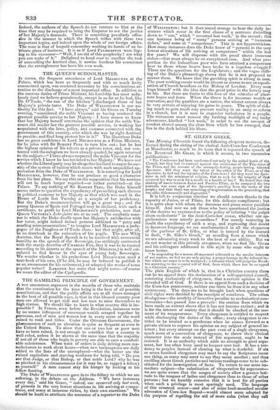THE GAMBLING PRINCIPLE OF GOVERNMENT. A ROT uncommon argument in
the mouths of those who maintain that the constitution for the time being is the best of all possible constitutions, and that the public affairs are at all times managed in the best of all possible ways, is that in this blessed country poor men are allowed to get rich and low men to raise themselves to high station. We should like to learn in what country this is im- possible ? In France, even before the Revolution, instances were by no means infrequent of enormous wealth scraped together by parvenus, and of men and women low in every sense of the word raised to rank and titles. Under the Ottoman Government, the phenomenon of such an elevation is quite as frequent as even in the United States. To show that one or two low or poor men have so been raised, is not enough to establish that a country. is well ruled, unless it be shown at the same time that the majority if not all of those who begin in poverty are able to earn a comfort- able subsistence. When want of orders is daily driving more ma- nufacturers to work short hours—when new bankruptcies are daily added to the lists of the unemployed—what the better are the ruined capitalists and starving workmen for being told, " Do you see that Judge, or that Bishop, or that noble Lord? why he was as pinched in his circumstances (or it may be, as ragged a fellow) as yourself." A man cannot stay his hunger by looking at his fellow feasting. The Duke of WELLINGTON gave in to the fallacy to which we are referring, in the debate on the Address. " We have instances every day," said his Grace, " indeed, one occurred only last week, of persons in the very lowest situations in life arriving at compe- tence, and many at immense riches, by their own exertions." We should be loath to attribute the nonsense of a reporter to the Duke of WELLINGTON; but it does sound strange to hear the daily in- stances which occur in the first clause of a sentence dwindling down to " one," which " occurred last week," in the second ; this one instance being of " many " persons arriving at " immense riches," and some at " competence." This is not hypercriticism. How many instances does the Duke know of " persons in the very lowest situations of life arriving at competence" within the last few years ? We will dispense with the proof about immense riches—that must always be an exceptional case. And what pro- portion do the industrious poor who have attained a competence bear to those whose hearts have broke in a hopeless struggle ?. These are the questions for the Legislature ; and the vague shift- ing of the Duke's phraseology shows that he is not prepared to answer them. We know that the gambling spirit is strong in man. The poor working curate would be almost as averse to see an equali- zation of Church benefices as the Bishop of London. Every man hugs himself with the idea that the great prize in the lottery may be his. But there are limits to this love of the stimulus of alter- nate hopes and fears. When the throw is for immense wealth or starvation, and the gamblers are a nation, the winner cannot always be very certain of enjoying his gains in peace. The spirit of risk- ing much to gain much may prevent mutiny in an army or reform in a church, but it is sure to engender turbulence in a people. The statesman must remove the farthing rushlight of any lucky adventurer, kindled " last week," in order to see the amount of comfort shared among the class from which he has emerged, that lies in the dark behind his blaze.


























 Previous page
Previous page